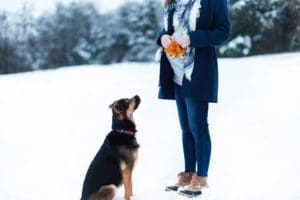Tips To Protect Your Infant from an Unruly Dog
Pet parents in New York’s Capital District, including Albany, Delmar, Clifton Park, Saratoga and Troy, realize that introducing any kind of significant lifestyle change in the household requires forethought and preparation – for both two-legged and four-legged family members.
Introducing your resident pooch to a tiny, newborn human infant is perhaps one of the more unnerving prospects, unless you do your homework and take steps ahead of time for a safe and smooth transition. All too often we read scary headlines about babies being mauled and even killed by dogs, such as this tragic incident published by The Daily News recently in Upstate New York’s Oneida Countyhttp://www.nydailynews.com/news/national/new-york-baby-mauled-death-family-pit-bull-article-1.2437241.
But canine training experts agree that proper steps taken ahead of time can mean the difference between harmony and tragedy.
But canine training experts agree that proper steps taken ahead of time can mean the difference between harmony and tragedy.
In this situation in particular, dog obedience training is more important than ever! There are quality puppy and dog obedience classes throughout the Capital District. Online reviews on Google and Facebook attest to as much. Albany and Saratoga Off Leash K9 Training professionals have a lot to say on the matter. (INSERT A QUOTE FROM ALEX HERE)
The American Society for the Prevention of Cruelty to Animals (ASPCA) has comprehensive advice to offer on the matter.
Here are some important highlights from the online article:
Bringing a new baby home will expose your dog to a cacophony of unfamiliar sights, sounds and scents – all of which may prove even more overwhelming to an older dog, such as a rescue, who wasn’t raised with small humans.
Prior to the baby’s arrival, if your pooch has enjoyed a role as top dog or “only child” in the home you must step up your game to accommodate his or her changing needs as they assume a new role.
How can you do this? In the months before the baby arrives focus on these two things:
- You must teach your pooch the skills he or she will need to interact safely with their new member of the family, as is easily accomplished through puppy classes and dog obedience training.
- Make a plan! You must help your pup adjust to the many new experiences and changes ahead. So practice what Albany dog trainers teach you and your dog as often as possible!
- Four months before the baby arrives: Gradually introduce your dog to the new experiences, sights, sounds and smells she’ll encounter when you bring your baby home, and associate these new things with rewards. This will help your dog learn to love life with the baby.
- One to two months before the baby arrives: Anticipate the changes you’ll make to your dog’s daily routine, and start making those changes.
Basic Dog Obedience Training includes Basic Manners, such as:
- Sit and down
- Stay, wait at doors and settle: These skills can help your dog learn to control her impulses, and they’ll prove useful in many situations. For example, you can teach your dog to lie down and stay whenever you sit in your nursing chair.
- Leave it and drop it: These two behaviors can help you teach your dog to leave the baby’s things alone.
- Greet people politely: A jumping dog can be annoying at best—and dangerous at worst—when you’re holding the baby.
- Relax in a crate: If you crate train your dog, you’ll know that she’s safe when you can’t supervise her, and she’ll have a cozy place of her own to relax when things get hectic.
- Come when called
Dog Obedience Training Can Include Special Skills:
- If your dog is nervous or timid, teaching her to target your hand with her nose will give her something to do when she’s around the baby, which might make her feel more comfortable and confident.
Teaching your dog to go away when you ask will enable you to control her movements and interactions with your baby. For example, you can use this cue to tell your dog to move away from the baby if he’s crawling toward her and she seems uncomfortable. Many dogs don’t realize that moving away is an option! If she learns that she can simply walk away from the baby when he makes her nervous, she’ll never feel trapped in a stressful situation—and she won’t be forced to express her anxiety by growling or snapping.
Practice, practice and practice again! Even try using a doll to play the part of the newborn baby who will soon arrive.
There is still much more information offered online on this topic by ASPCA at this link:http://www.aspca.org/pet-care/dog-care/dogs-and-babies.


